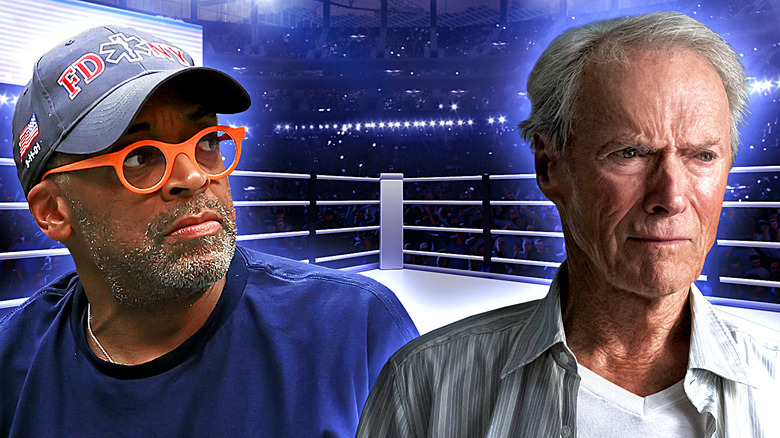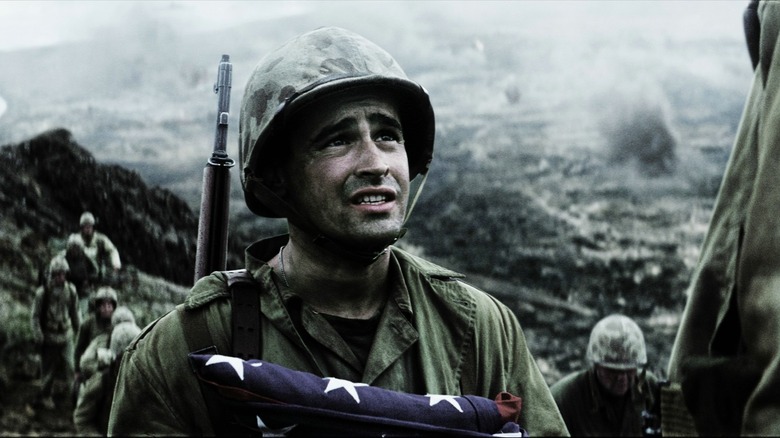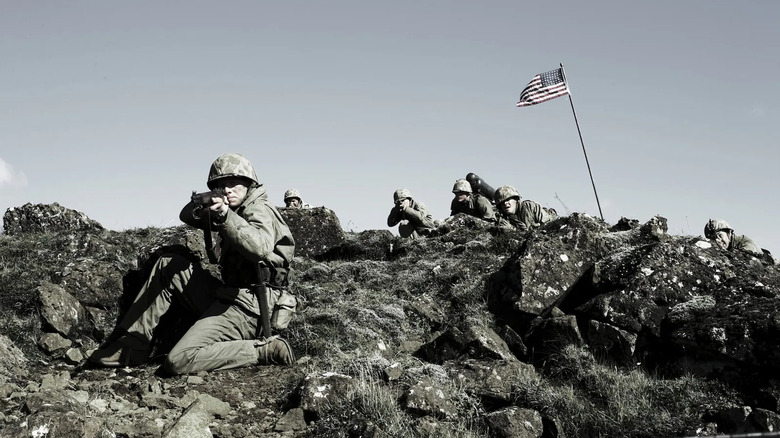Clint Eastwood & Spike Lee's Feud Got So Bad That Steven Spielberg Had To Step In
Clint Eastwood's 2006 war picture "Flags of Our Fathers," based on the book by James Bradley and Ron Powers, told the story of the five Marines and one Navy corps soldier who famously raised an American flag at the top of Mt. Suribachi during the 1945 Battle of Iwo Jima. The moment was captured in an equally-famous photograph by Joe Rosenthal, and it served as the model for the Marine Corps War Memorial in Arlington Ridge Park in Arlington, Virginia. It's one of the more famous American images of the World War II battlefield. Eastwood built an entire film about the Battle of Iwo Jima, climaxing with the raising of the flag.
Eastwood shot "Flags of Our Fathers" back-to-back with "Letters from Iwo Jima," also released in 2006, which told the same story from the perspective of the Japanese soldiers, diplomatically balancing out the thudding, bland patriotism of "Flags." Of the two, "Letters" was widely considered to be the superior film. It was nominated for four Academy Awards, including Best Picture and Best Director.
Celebrated director Spike Lee wasn't fond of either one of Eastwood's films, however. Indeed, Lee openly lambasted Eastwood's exclusion of Black Marines in both films, pointing out that many Black soldiers were indeed present at the Battle of Iwo Jima. Marc Eliot's 2010 biography "American Rebel: The Life of Clint Eastwood" details the comments Lee made at the 2009 Cannes Film Festival, where his own WWII film "Miracle at St. Anna" premiered. Lee implied that Eastwood was a stodgy old man who didn't even consider Black characters for his films, just like many Hollywood filmmakers before him.
Eastwood shot back at Lee, saying that the "St. Anna" director's history was a little off. The conflict only escalated from there, with the pair's rivalry playing out in public. Eventually, the two filmmakers required the intervention of no one less than Steven Spielberg to assure the heat was turned down.
Spike Lee and Clint Eastwood butted heads over the role of Black Marines in World War II
In an interview with The Guardian in 2008, Eastwood was finally made aware of Lee's criticisms of "Flags of Our Fathers." Lee felt that Eastwood was engaging in hurtful historical whitewashing when he noticed no Black Marines in Eastwood's film, saying to reporters that the film "was his version. The negro version did not exist." Eastwood defended himself by explaining that the premise of his film was to explore the circumstances of the famous Joe Rosenthal photo, and the soldiers seen in it. The soldier in the photo were all white, so Eastwood reasoned he was bound by history. "[Black soldiers] didn't raise the flag," he noted. "The story is 'Flags of Our Fathers,' the famous flag-raising picture, and they didn't do that. If I go ahead and put an African-American actor in there, people'd go, 'This guy's lost his mind.' I mean, it's not accurate."
Eastwood also recalled that Lee criticized him for making "Bird," a biography of Charlie Parker, back in 1988. Evidently, Lee felt that a Black director would have been better suited to make a biography of a Black icon like Parker, and Eastwood disagreed. "I'm playing it the way I read it historically, and that's the way it is," Eastwood stated. "When I do a picture, and it's 90% Black, like 'Bird,' I use 90% Black people." Eastwood finished his comments by saying that "A guy like him should shut his face."
Lee read the Guardian interview, and, naturally, was peeved, saying to ABC News:
"The man is not my father, and we're not on a plantation either. He's a great director. He makes his films, I make my films [...] And a comment like 'A guy like that should shut his face' — come on, Clint, come on. He sounds like an angry old man right there."
Indeed, the title "Our Fathers" is presumptuous. The flags of exactly whose fathers, Clint?
It took Spielberg to bring Eastwood and Lee's rivalry to an end
Lee knew his stuff, however, pointing out that he wasn't making idle accusations. In his own words:
"I'm not making this up. I know history. I'm a student of history. And I know the history of Hollywood and its omission of the one million African-American men and women who contributed to the second World War. Not everything was John Wayne, baby."
One might say that Lee's own "Miracle at St. Anna," a WWII film about a platoon of Black soldiers, was meant to serve as a direct rebuttal to Eastwood's films.
In Eastwood's defense, there were a few scenes of Black soldiers in "Flags of Our Fathers," and there was a shot of a Black soldier being carried off the battlefield. These moments, however, are very, very brief.
According to Eliot's biography, it took Steven Spielberg to calm their tempers. Spielberg served as producer on Eastwood's two 2006 war films, and has also called himself a friend to Spike Lee. The matter was personal, so there is no record of the conversations Spielberg had with Lee or with Eastwood, although imaginative cineastes would like to picture a lunch where the three met and talked things out. Spielberg seems to have brought the Lee and Eastwood feud to a diplomatic end, as Lee would eventually send Eastwood a future work-in-progress (sadly unidentified) for a private screening.
Lee and Eastwood still aren't close friends, but their brief headbutting over "Flags of Our Fathers" is seemingly a thing of the past.


